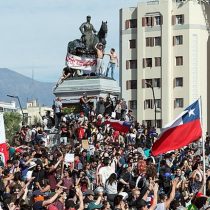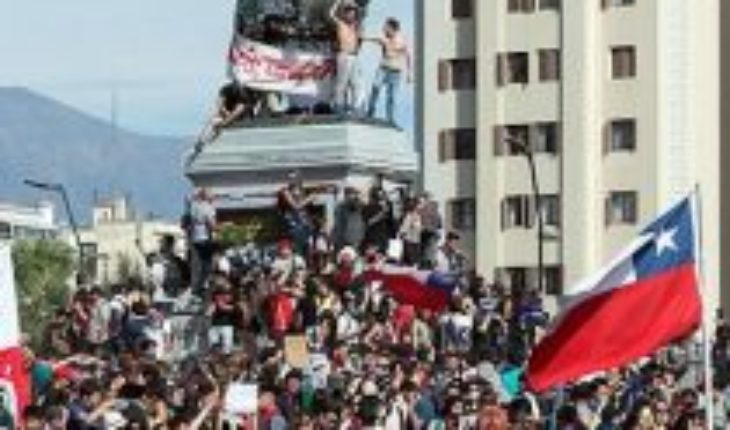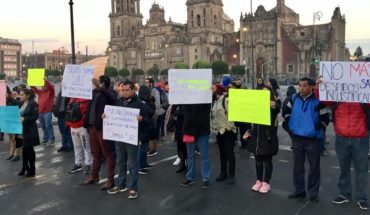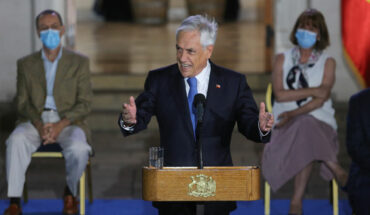
Despite the very low support of all the political structures, presidency, parliament, political parties and other state powers, all its actors seem to understand that nothing happens outside their circle, as in the case of parties. They fight, accuse and denounce, exhibit conduct and expressions, between absurd and rabid. They believe that all social life goes through their decisions, In the space that is outside that of the political class there is another reality: that of the protests, rebellious, violent or not, who march, paint, shout, perform all kinds of acts to make their demands felt and needs, and remain more or less faithful to the three original claims: pensions, minimum wage and health with affordable remedies, in a context of dignity. But the political class believes that this rebellion is digitized from actors also political and with parliamentary representation, to nuance, suppose that these politicians guarantee violence, in collusion with other soulless people coming from abroad, from countries with “populist” regimes that, if true, would be assilating in our country. That is, the degree of isolation of our political class is total, narcissistic even, self-referential to the extreme and with very little connection to the social outburst.
Both political sides are equivalent, not exactly, but both have faults, one for opposing empirically in moving towards a better democracy; others for betraying their ideals and defrauding their voters (which militants remain few). That is why the strength they show when arguing is striking; you may wonder if so much passion is true.
Well, let’s put aside the political elite, whose great triumph was to put the need for a new constitution (which was not in the early days of protest) and mention the large number of other organizations that tried to lead and lead a protest more or less anarchic. To this day we see unions, student groups, emerging parties that self-attributed historical political innocence and many more, under the pretext of leading or putting some degree of control All have failed miserably and, perhaps, the idea of a new constitution that was institutionalized and whose debates have won the attention of the media: Of course this by a fake dramatify of the options. It is a debate of an infinite ramping (some believed that Chile’s future depended on the comedians of the Festival de Viña).
The actors who protest are from the middle low, popular, marginal and even lumperic sector, they are joined by the very fact of protesting because their role is based on subjectivity. But they have no system transformation goals, let alone a replacement proposal than there is. That’s why this is not a pre-revolutionary period. When there is no common purpose, but many united by the same act of protesting and thus expressing historical frustration and anger. But as the social system is seen as alien, everything is criticized, everything can be scratched, destroyed and undone the visible expression of the system, such as squares, streets, traffic lights, facilities, etc.; labor sources, workers, the poor in general. Everything that smells to the above normal is susceptible to destruction. If the political system cannot be radically changed, the other subsystems are also questioned, disregarded and, in their visible expressions, destroyed: This is seen in looting and business fires, from small ones to some businesses and supermarkets. That is, expressions of economic and religious structures; the family is so deteriorated and is the subject of so many ways of understanding it that it is not necessary to put flames in it.
But these actors of civil society – because they obviously do not owe their existence to the state – are children of these individualistic times and will not join in the agreements of the elites of any kind. That is why the rejection of parties that claim to share their ideals and have been mercilessly flainted. So they have a different culture from the traditional culture of the Left, the most striking thing is that they expect a government, which has completely different ideas that have the protagonists of the burst, to make the changes. Perhaps some protests will call not to participate in the plebiscite over the Constitution because there will be no constituents outside the social foundations of citizen rebellion
The language topic is another element to consider in any analysis. Supporters and adversaries of the social outburst occupy a language that refers to the Cold War or the Left-Right dichotomy or at least government and opposition. No new codes are appreciated to understand what’s going on. This unstructured movement is an e-movemenet, anarchic, and without centralized leadership, since it rests on digital communications, as a symbolic space of counter-power and as a means of communication; even as a historical record. Social change is, among others, a change of power, so mobilizations and protests tend to install a counterpower, such as numerous concentrations and marches, and also takes, denouncements, funas and other acts that demonstrate power before power. But a process of social rebellion is a struggle between actors and social structures around power; Today we are facing a communicative rebellion; indeed, we now have technological, but informal and depersonalized communication networks, with no culture of militancy in a case, if not more or less specific encounters, with much free initiative, as is in graffiti. Contrary to militancy, there is an intense commitment, which does not include all life, because ties are of a non-political nature, but rather of affinity of barrists, of neighborhood, of educational establishments and, as the authority suspects, of criminals linked to drug trafficking. But, by the way, most of the supporters of the fly are not of any of them. Each of these actors is supposed to retain their language and symbology; That is, pure heterogeneity. It seems that class differences were extinguished and diluted in other distinctions, the most visible being feminist or sexual minority causes. There is a language that reaches hands with slogans on the most classic left, but decontexted by anachronistics. Moreover, rejection of the model, neoliberalism or capitalism does not propose changing the current system for another. That’s why I couldn’t ask them to make a reasonable proposal, because language shows a lot of negative emotions and feelings, rather than logical ideas. This fundamental feature of civil society actors protesting because they feel abused, unbeused, exploited and despised for being poor – whatever their meaning – and so they cannot live on a horizon of meaning. Obscenities, destruction or damage to icons of those incorporated into the system are ways to veto the society outside of them. Therefore, there is a process of resignificance and contempt that was brewed long before. Communicatically, digital media defies formal power through a counter-power based on alternative information, opposed to the official one. These actors are postmodern, in the sense that, without sacrificing their individuality, they have real possibilities to resist order by creating spaces of meanings that operate as spaces of resistance. So society became a space of symbolic struggle through technology to change the meanings of concepts (those who no one knows that contents will later have the words). The example is the current dispute over the introduction of new words and new content to concepts, such as the new name of Plaza de la Dignidad. For those who social actors do not have to communicate with political actors.
The restraint of social rebellion has not happened because individuals are citizens who know their rights. But they are individualistic citizens, educated in an individualistic society, as it is said: “We talk more”, “now I know my neighbors”, among others.” But the risk is to reach endless demands, such as No More AFP, No More PSU, No More TAG, No More CAE, No More Femicide, Free Abortion, End to Patriarchy, Decent Pensions, Decent Health Care, Affordable Remedies, Discounted Passages for Seniors, et cetera, because there are many more. The political elite ended up arguing about a new constitution that was not a demand of the early days and set up a parallel scenario in their ventilated microdisputes in the press and with very unsophisticated, basic, sometimes arguments.
The subject of violence has been hotly debated, robberies, robberies, delegitimized assaults delegitimize the movement, lose the communicative battle, in the background, give ammunition to the enemy. Without leadership and with an anomalous spontaneism in his action, oblivious to class considerations, any violence that harms the poor, the old and the weak of any kind can be condemned. The damage to jobs, income, health and quality of life, show a wrong rebelliousness because it affects those it claims to defend. So the question about the ethical parameters of the protesters is valid.
On the other hand, the political regime avoids its downfall, granting some very minor benefits, some that require a lot of time to achieve them and there was no gain in the main demands: The President stated that there are no more resources for benefits.
But how long can popular citizen mobilization be maintained? The government, in general the entire political class has chosen to give lengths to the movement opting for wear and tearbut the movement may continue to feed on frustration and not be demoralized promptly.
The stablishment has avoided its collapse by offering the promise of change of the constitutional, that is, politics in exchange for social peace, while maintaining the political regime. However, the re-establishment of the multi-political alliance between government and opposition, even if it has now repented, has so far proved successful in defending the social system, the political system above all. That is why the current campaign of terror is a sign of obscene and is not understood.
The dominant bloc’s commitment is to produce the least possible changes in the economic structure of the country, integrating some “social rights”, without changing the substantive of the pattern of accumulation. Without changing or modifying the form of nation-state. Unthinkable will be, for example, the establishment of a Plurinational State, nor instead to install participatory or other social democracy instead of liberal-representative democracy. The process of constitutional change designed between the governing parties and the opposition, has limitations that would prevent a historical and profound political change of the structures of social power currently in force.
A constitutional change does not produce a significant inflection, I stress that the demands of the popular actors are not of a legal nature and less of constitutional law or political philosophy – think of the theoretical debate of solidarity state in the face of a Subsidiary State–. for this is a quasi-popular rebellion for urgent reasons, which for many are survivals, as in the case of the poor of the third and fourth ages. But the crisis of national modernity, which is what the rebellion shows, will not be the mother of a fundamental charter or a new hegemony for a new social pact, and it is not pure pessimism; indeed, the measures taken by the Executive and approved by parliament have no abit of structural transformation or a new cultural and political hegemony. No one will change their allegies.
The crisis of modernity, as it always has been, is that it has not reached many sectors, mobility has not been enough and for many it has been precarious, because an economic shock that alters the family budget ends with the dream of social ascent. Rational action – or rationality, as any first-year sociology student knows it – is expressed in two kinds of sociology: technical or instrumental rationality and valoric rationality, the first is calculating, because it tends to maximize products or gains, blindly and without personal considerations; the second is concerned with achieving values, those that are not transmountable. When it comes to problem solving. For example, in education, for the majority of the country this is a non-doable good, for the President it is a market good. We face two logics, two ways of perceiving reality, two excluded epistemologies to reach agreements. That is why the debate, which, stricto sensu, is not political, is therefore confronted, because it has no political arguments, besides that you have no glimpses of objective reality, but pure sensitivities and emotions. In the national case, popular protest has a predominant characteristic of subjectivity and emotions, such as anger and negative feelings expressed in harm and violence to objects, people and symbols of an unjust society, so attacks and language excessiveness, moderation or serenity cannot be asked; but the system does not do better, a modern economy is one whose predominant trait is a rational market, with competition guaranteed by no distortions; but the system whose central axis is the economy did not have a modern or rational market, on the contrary, there was a premodern, bucenty market, based on collusions, disguised monopolies, rope agreements, and semi-legal benefits, payments to politicians, legality ad hoc, among others; i.e. a more technological, white-collar and English-recognized economic system of a banana republic, with international recognition in the international financial world, but many also international studies were prophetic in predicting a possible protest, which eventually happened. There is also a cause of exclusion here, for there are two worlds, that of economic, financial success, above all, and the world of everyday and walking Chile. That world that was convinced that if it failed was their fault, for they did not manage themselves well. That changed.
Every outburst, burst or protest has a tension between political reason and political passion, the latter being, in Europe at the beginning of the twentieth century, a sociopolitical expression of cultural aesthetic romanticism. That dichotomy is also present in Chile now. Romanticism is a culture that is not based on the political calculation of instrumental rationality, but is also not based on substantive rationality, according to values, but seeks causality beyond logical argumentation, so it is ideological and in the experience of a romantic political action matters how it looks, the aesthetics, and how it is justified for each one; I mean, no matter how good and logical my action is, but how good it seems to me and whether I like what I do or not. That is why there are authoritarian behaviors while there is rejection of authority, there is a certain fascism that forcibly imposes its truth and does not take charge of the unintended effects of destruction. A moral eximition a priori. That is why it is not possible to lead social actors, not just rebels, to confront with a set of arguments the demands and the ways of protesting. There is an implicit demand that is symbolic in nature and requires a great deal of empathy; also of searching for meaning. The creation of roles, of a social division of protest labour (first, second and other lines) give meaning to a self-defintion of heroism, of tacit repeal of society, of history and of its symbols, hence feminism that also repeals story as a temporary chain of oppression. Or the burning of churches that are seen as the glue of an unjust society. So we have a real collusion of two ways of understanding reality, two paradigms. Romanticism is a replacement for the absence of ideology and the traditional and permanent political theoretical debates very typical of the political left (and not so much cultural as now). Although a story and a slogan of leftist tone are appealed, it is not strictly a left-wing protest; words such as revolution have lost their conventional meaning: system change.
So, we have a protracted, heterogeneous, multiclassist and segments disincorporated, combined rather than integrated, with precarious organization, especially digital, without proposal of clear political objectives, with much more importance in the process , the protest itself, with multiple redefinitions of the concepts used by previous generations; with a rigid moral it seeks culprits, to display them in a virtual gallows to defuse them, with a maximalist language of many obscenities, even to analyze reality and, most importantly, in its visible expression is a protest never seen. However, the crises of modernization have always existed and societies have overcome them, the Santa María de Iquique School was a way to eliminate this crisis, today the times would not allow it.
The content poured into this opinion column is the sole responsibility of its author, and does not necessarily reflect the editorial line or position of El Mostrador.





